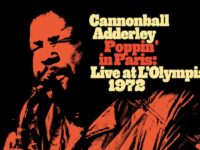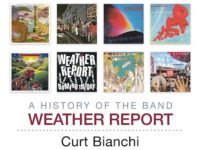Julian “Cannonball” Adderley, a spirited, bluesy and always fun performer, seemed to burst out from a series of early live recordings during a period when that was rare.
In the late 1950s and early 1960s, there were just too many logistical nightmares, from getting good takes in the smoky, raucous atmosphere of a nightclub, to finding a way to get music played on the radio when it often spooled out well past the typical playing time of a hit song. The technology was bad, the sales were often poor, and the work took extraordinary patience. Thank God, then, for Riverside producer Orrin Keepnews.
There was no better way to hear the muscular soul, and the impish interplay, between the altoist, brother Nat Adderley (cornet) and the rhythm section of Louis Hayes (drums) and Sam Jones (bass) — and between the Adderley group and its often raucous audience members. Keepnews captured it, and from the very beginning.
[ONE TRACK MIND: Jazz pianist Michael Wolff talks about key moments alongside Julian “Cannonball” Adderley in the 1970s.]
 “In New York,” taped on Jan. 12 and 14, 1962 at the Village Vanguard, bulks up a sound we first heard on the 1959 Riverside release “Live in San Francisco” by also including multi-instrumentalist Yusef Lateef (featured on flute, tenor and oboe) and pianist Joe Zawinul — appearing on his first sides with Adderley, after joining the band in the summer of 1961. Both Lateef (the dabbler who had become intrigued by Eastern music, and obscure reed instruments) and Zawinul (the offbeat Austrian who seemed born into the full-throated blues style of Art Blakey acolytes like Horace Silver or Bobby Timmons) provide a fuller, more textural background for the sibling soloists, even while adding their own offbeat and exotic vibe to what was always an R&B-infused sound for Cannonball.
“In New York,” taped on Jan. 12 and 14, 1962 at the Village Vanguard, bulks up a sound we first heard on the 1959 Riverside release “Live in San Francisco” by also including multi-instrumentalist Yusef Lateef (featured on flute, tenor and oboe) and pianist Joe Zawinul — appearing on his first sides with Adderley, after joining the band in the summer of 1961. Both Lateef (the dabbler who had become intrigued by Eastern music, and obscure reed instruments) and Zawinul (the offbeat Austrian who seemed born into the full-throated blues style of Art Blakey acolytes like Horace Silver or Bobby Timmons) provide a fuller, more textural background for the sibling soloists, even while adding their own offbeat and exotic vibe to what was always an R&B-infused sound for Cannonball.
“In New York” begins with one of Adderley’s signature introductions, nearly two minutes long, before leaping into an inviting waltz time signature. The soloists quickly cut across that sweetly swinging rhythm, however, ramping up into a churning conversation piece — and eliciting several excited responses from a quickly engaging audience.
“This one has two different characteristics,” Adderley says from the bandstand. “I think that accounts for the reason that its composer (Jimmy Heath) decided to call this one ‘Gemini.'”
That dichotomy continues to play out across this terrific recording, as Adderley’s long standing collective runs parallel and then becomes intertwined with these new voices from Lateef (added just three weeks before this show) and Zawinul. Lateef provides two compositions, the sexy “Planet Earth” and a delicate, oboe-driven “Syn-anthesia,” while Zawinul adds the bop breakdown “Scotch and Water.”
Zawinul, who passed away in 2008 as Keepnews was at work on a digital remaster of “In New York,” would of course become an integral part in the Adderley band into the late 1960s (composing “Mercy, Mercy, Mercy” and “Country Preacher”). He worked with Miles Davis, later formed Weather Report with Wayne Shorter and dabbled in the then-new world music genre, but always credited Cannonball for helping him find early, wider notice.
Adderley’s sextet, interestingly, also covers the vamp written for one John Birks Gillespie by 1950s big-band composer Ernie Wilkins — Cannonball, winking, says “‘Dizzy’s Business’ and our business are pretty much the same thing: To swing!” — before ending things with the barnburning closer, “Cannon’s Theme,” from Jones.
Adderley, a former school teacher, must have seemed surprisingly articulate for the uninitiated, those who thought they were stumbling in for a night of mindless, greasy grooves. But he always approached his work with as much warmth as he did intelligence, and Adderley slipped in more than a few important messages along the way.
That made him, for me, an underrated persona in the style of Gillespie — unfortunately known more for “soul jazz,” the caricature of his work, than for the more complex things (his passion for bop, the interesting side projects he tackled that used African stylings, his overt political musings) that always moved just beneath the surface. “In New York,” which so completely changed the complexion of Adderley’s familiar environs, only underscores how much he quietly tried to push the envelope.
Adderley, like Dizzy, was more important, more interesting than many gave him credit for — though like Gillespie before him, the altoist never pushed the point.
With it, but never pedantic, they embodied a concept that Adderley talks about, during one mirthful moment at the mic on this long ago night: “Hipness is not a state of mind — it’s a fact of life. You don’t decide you’re hip. It just happens that way.”
- Nick DeRiso’s Best of 2015 (Rock + Pop): Death Cab for Cutie, Joe Jackson, Toto + Others - January 18, 2016
- Nick DeRiso’s Best of 2015 (Blues, Jazz + R&B): Boz Scaggs, Gavin Harrison, Alabama Shakes - January 10, 2016
- Nick DeRiso’s Best of 2015 (Reissues + Live): John Oates, Led Zeppelin, Yes, Faces + others - January 7, 2016





